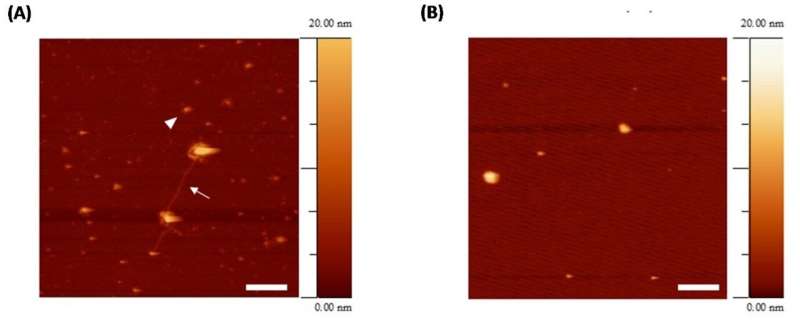An international team of researchers led by Lancaster University has made a promising breakthrough in the development of drugs to treat Alzheimer’s Disease. For the first time, scientists have developed a drug that works on both major aggregation-promoting “hotspots” of the tau protein in the brain—a key driver of neurodegeneration.
The drug, a peptide inhibitor called RI-AG03, was effective at preventing the buildup of tau proteins in both lab and fruit fly studies.
The research, published in Alzheimer’s & Dementia, was led by Lancaster University in collaboration with the University of Southampton, Nottingham Trent University, Tokyo Metropolitan Institute of Medical Science and the University of Texas Southwestern Medical Center.
The Lancaster University team included the late Professor David Allsop and the late Dr. Nigel Fullwood, who were both from the Faculty of Biomedical and Life Sciences at Lancaster University.
The paper describes how RI-AG03 was first developed by Dr. Anthony Aggidis in the laboratory of the late Professor Allsop, using computational biology, where it was tested in lab dishes.
Lead author Dr. Aggidis, former Postdoctoral Research Associate at Lancaster University and visiting researcher at the University of Southampton, said, “Our research represents an important step toward creating treatments that can prevent the progression of diseases like Alzheimer’s disease. By targeting both of the key areas on the tau protein, this unique approach could help address the growing impact of dementia on society, providing a much-needed new option for treating these devastating diseases.”
A significant breakthrough
Tau proteins play a crucial role in maintaining the structure and function of neurons (brain cells). But in Alzheimer’s disease, these proteins malfunction, clumping together to form long, twisting fibrils. As the fibrils accumulate, they create what are called neurofibrillary tangles—masses of twisted tau proteins that clog the neurons, preventing them from getting the nutrients and signals they need to survive.
As more neurons die, memory, thinking, and behavior become increasingly impaired, leading to the cognitive decline seen in Alzheimer’s.
There are two specific “hotspots” of the tau protein where this clumping tends to happen. While current treatments target one or the other of these hotspots, RI-AG03 uniquely targets and blocks both.
Amritpal Mudher, Professor of Neuroscience at the University of Southampton, said, “There are two regions of the tau protein that act like a zipper to enable it to aggregate. For the first time, we have a drug which is effective in inhibiting both these regions. This dual-targeting mechanism is significant because it addresses both domains that stimulate tau aggregation, potentially paving the way for more effective treatments for neurodegenerative diseases like Alzheimer’s.”

Targeted approach
The peptide-based approach is also more targeted than current treatments, potentially making it safer, with fewer side effects.
Dr. Aggidis said, “We know that the toxicity of the tau protein is intimately linked with its ability to aggregate, so by inhibiting aggregation we expect to see desirable effects. But current aggregation inhibitors have had many side effects because they can interfere with the functions of many other proteins. RI-AG03 is specifically designed against the tau protein, meaning it’s less likely to undesirably interact with other proteins.”
Testing RI-AG03
To test its effectiveness in cells within a living organism, researchers at the University of Southampton then gave the drug to fruit flies that had pathogenic tau. These fruit fly models of Alzheimer’s Disease were generated by Dr. Shreyasi Chatterjee, who is a Senior Lecturer at Nottingham Trent University.
The researchers found that the drug suppressed neurodegeneration and extended the lives of the flies by around two weeks—a significant extension considering the life span of the insects.
To understand what was happening, Southampton’s scientists looked deep into the brains of the fruit flies.
Professor Mudher said, “When we didn’t feed the flies with the peptide inhibitor, they had lots of the pathogenic fibrils, which group together to make up a tangle. But when we fed them with the drug, the pathogenic fibrils decreased significantly in quantity. The higher the dosage given, the greater the improvement we saw in the fruit fly’s lifespan.”
To make sure this wasn’t unique to fruit flies, researchers at the University of Texas Southwestern Medical Center tested the drug in a biosensor cell—a type of living human cell line that is engineered to detect pathogenic tau fibril formation. Here too, they found that the drug successfully penetrated the cells and reduced the aggregation of tau proteins.
The team believe their work will have a significant impact on drug discovery efforts in the field of neurodegenerative diseases and now plans to test RI-AG03 in rodents, before proceeding to clinical trials.
Dr. Richard Oakley, Associate Director of Research and Innovation at the Society, said, “Dementia is the UK’s biggest killer, and it applies enormous cost and pressure to our health care system… This research is taking promising steps towards a new one-of-a-kind therapy which targets tau, a damaging protein in the brains of people living with Alzheimer’s, preventing it from clumping together. This drug has the potential to be more targeted than others currently being studied, and we hope it will result in fewer toxic side effects.
“It’s important to note that the study is in its early stages, so we don’t yet know if it will work or be safe for humans, but it’s an exciting development and we look forward to seeing where it leads.
“Research will beat dementia, but we need to make it a reality sooner through more funding, more partnerships, and more people taking part in dementia research.”
More information:
A novel peptide-based Tau aggregation inhibitor as a potential therapeutic for Alzheimer’s disease and other Tauopathies, Alzheimer’s & Dementia (2024). DOI: 10.1002/alz.14246
Citation:
Promising Alzheimer’s drug candidate prevents buildup of tau proteins in lab and fruit fly studies (2024, October 3)
retrieved 3 October 2024
from https://medicalxpress.com/news/2024-10-alzheimer-drug-candidate-buildup-tau.html
This document is subject to copyright. Apart from any fair dealing for the purpose of private study or research, no
part may be reproduced without the written permission. The content is provided for information purposes only.

